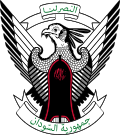Libya–Sudan relations
This article has multiple issues. Please help improve it or discuss these issues on the talk page. (Learn how and when to remove these messages)
|
 | |
Libya |
Sudan |
|---|---|
The Libyan–Sudanese relations refers to the long historical relations between Libya and Sudan, both are Arab countries.
Libya and Sudan share an isolated border along a corner of northwestern Sudan that neither government has ever fully controlled.[1] This state of affairs left open the possibility for a variety of real and perceived activities in the region that caused Khartoum to suspect that Libya periodically acted against its interests.[1] Conflict between Libya and Sudan has occurred intermittently since relations between the two countries began to deteriorate in 1972.
Under Colonel
History
Early relationship
Between 1967 and 1971, Libya–Sudan relations was based on a foreign policy favoring
Subsequent to Libya's shaky alliance with the Nimeiry regime and Gaddafi's
Rifts and the 1970s
During the fall of 1977, Nimeiry and Sudanese opposition leaders began attempts at reconciliation.[11] Subsequently, starting in February 1978, Libya and Sudan agreed to resume relations. However, relations soon become strained after Gaddafi condemned Sudanese support for President Anwar Sadat of Egypt who signed the September 1978 Camp David Accords.[11] This difference of political and ideological position toward the situation in Israel, gave Gaddafi the encouragement to support plots against the Egyptian leader Anwar Sadat and Nimeiry.[12]
Between 1978 and 1980 Gaddafi's
1980s
Gaddafi, who has determined Libya's foreign policy since 1969, has consistently been a proponent of Arab unity, the advancement of Islam, the Palestinian cause and anti-Western sentiments. He has also supported the elimination of Israel.[2] Hence, Gaddafi's antagonism towards Egypt was a response to Sadat's push for a separate peace with Israel. As an additional foreign policy point, Libyan actions in the region often signified strong expansionist aims. This provides the context for understanding how, in January 1981 Radio Tripoli announced the intended merger of Libya and Chad, after Gaddafi said that Chad was part of Libya's “vital living space.” This announcement alarmed neighboring African states including Sudan. They had already suffered from Gaddafi's participation in trying to disrupt the governments of Sudan, Egypt and Tunisia through coups and assassinations after failed attempts at unification.[10] By the end of January 1981, the Organisation of African Unity (OAU) formally condemned Libya's intentions for unification with Chad and asked Gaddafi to remove his troops from Chad immediately.
Gaddafi's resentment of Western influence in the region becomes apparent when in 1981 Chester Crocker, the Assistant Secretary of State for African Affairs announced that the US was willing to funnel military aid to any of Gaddafi's neighbors who saw the problem as they saw it.[12] This provided Sudan another avenue to obtain US foreign aid. Sudan received $250 million in economic and military aid in 1982, and more than $200 million in 1983 from the United States.[12]
In 1983, six years after Nimeiry and Sudanese opposition leaders began attempts at reconciliation, opposition from the
Nimeiry prevailed against the 1983 Libyan backed opposition but relations between the two countries continued to suffer when in March 1984, Nimeiry claimed that a Libyan Air Force Plane, a Soviet-built Tupolev TU-22 bomber, based at an airfield in the Al Kufra oasis in south-east Libya, had killed five people in an air raid on Omdurman.
On April 9, 1985 Lieutenant General Dhahab ordered the formation of a fifteen-man Transitional Military Council (TMC) to rule Sudan. The TMC suspended the constitution; dissolved the SSU, the secret police, and the parliament and region assemblies dismissed regional governors and their minister; and released hundreds of political detainees from Kober Prison.
In July 1985, Libyan-Sudanese relations once again fluctuated, this time becoming stronger after a military protocol was signed between the two countries. Despite Gaddafi’s strong support for the Sudanese opposition leader Sadiq al-Mahdi,[11] in December 1985, many Libyans labeled as “Islamic extremists,” were gathered and exiled from Sudan.
In February 1986 the International Monetary Fund declared Sudan bankrupt, after the Dhahab government refused to accept IMF economic austerity measures. Later that year Sadiq al-Mahdi was declared the
On June 30, 1989, Colonel (later Lieutenant General) Omar al-Bashir overthrew Mahdi and created the Revolutionary Command Council for National Salvation to govern Sudan. Early in 1990 Sudan and Libya discussed the idea of unification between the two nations. In July of that year the first meeting of the Libyan-Sudanese Joint General People's Committee was held, and the Councils of Ministers of the two countries met in a combined session. The chief result of this meeting was greater economic cooperation, not the previously discussed political unification. Libya and Sudan signed a trade and development agreement that had Libyan investment in agricultural projects in exchange for guaranteed access for the Sudanese agricultural products.[16] In October 1993, the Revolutionary Command Council which was created a few years earlier was dissolved. The leader of the coup d'état, Lieutenant General Bashir, became a civilian president, and all the vital offices of government were now held by members of the NIF political party or their sympathizers.[15]
1990s
“The pro-Libyan attitude of black African states has prompted Gaddafi to adopt a new foreign policy towards the continent.[6] “In general, the future of Libya’s relations with the countries of the region is likely to be influenced by Gaddafi’s rapprochement with the Arab countries and with the West.”[6] Libyan and Sudanese ties were further cemented when in February 1999 an economic cooperation agreement was signed between the two countries and four other Sahel states.[16] As alluded to earlier, Libya's relations with Sudan were in many respects a consequence of relations with Egypt.[4] “Particularly important is the rapprochement with Egypt. The two countries have agreed to integrate their economies and to co-ordinate their African policies, especially in relations to Sudan. In August 1999, at a summit conference held in Cairo, Egyptian President Hosni Mubarak and Gaddafi agreed to mediate an end to Sudan’s civil war. The regimes of both Libya and Egypt have confronted and/or continue to confront armed Islamic opposition and consequently both share an interest in Sudan, a country that has been accused of harboring radical Islamic groups. Above all, however, the Egyptian-Libyan initiative seems to reflect a joint fear on the part of the two countries that Washington supports the secession of southern Sudan and the break-up of an Arab country.”[6]
Relations between Libya and Sudan were strained after 2002 due to Muammar Gaddafi and the
21st century
In the early 2000s, Sudan and Libya made concerted efforts to improve relations.[1] The last half of 2002 witnessed a series of high-level meetings between Libya and Sudan.[1] The Sudanese foreign minister at the time, Mustafa Uthman Isma’il, and his Libyan counterpart agreed to work for peace in Sudan within the framework of Sudanese unity, establish a committee for political coordination, and take measures to implement agreements on customs, the Nile international fund, trade, taxation, and investment.[1] Also in 2002, the Higher Ministerial Committee for Libyan–Sudanese Integration agreed on a number of political and practical issues, including condemnation of American threats to launch “unjustified aggression” against Iraq.[1] In 2004, as the crisis in Darfur worsened, Libya hosted informal consultations between representatives of the Sudanese government and the rebel movements.[1] The rebels rejected the Libyan initiative and insisted that the Joint Commission of the African Union serve as the principal interlocutor.[1] This development did not deter First Vice President Taha in 2005 from urging al-Qadhafi to help find a solution to the Darfur crisis.[1] Relations between Libya and Sudan were generally good but remained unpredictable, primarily as a result of the mercurial leadership in Tripoli.[1] Sudan saw al-Qadhafi as a periodic problem that needed to be contained.[1] It was better to bring him into the tent than to try to exclude him.[1] As a result, Sudan did not object to al-Qadhafi's efforts to mediate both the Darfur conflict and the earlier conflict in Eastern Sudan.[1] The two countries settled on a policy of coexistence.[1]
In 2011, the
In July 2017, General Khalifa Haftar of the Libyan National Army ordered the closing of the Sudanese consulate in the town of Kufra, and expelled 12 diplomats. The consul and 11 other consular staff were given 72 hours to leave the country. The reason given was that the way it conducted its work was "damaging to Libyan national security." The Sudanese government protested and summoned the Libyan chargé d'affaires in Khartoum, Ali Muftah Mahroug, in response. Sudan recognises the Government of National Accord in Tripoli as the legitimate government of Libya, not the House of Representatives that is backed by General Haftar. As of 2022, Sudan has an embassy and consulate located in Tripoli to provide services to the Sudanese residents.[23][24]
See also
References
- ^ ISBN 978-0-8444-0750-0.)
 This article incorporates text from this source, which is in the public domain. Though published in 2015, this work covers events in the whole of Sudan (including present-day South Sudan) until the 2011 secession of South Sudan.
This article incorporates text from this source, which is in the public domain. Though published in 2015, this work covers events in the whole of Sudan (including present-day South Sudan) until the 2011 secession of South Sudan.{{cite encyclopedia}}: CS1 maint: postscript (link - ^ a b c d "Libya". Retrieved 24 November 2017.
- ^ [1][permanent dead link]
- ^ a b c d George Joffe, “Libya’s Saharan Destiny,” The Journal of North African Studies, 10, no. 3–4 (2005)
- ^ a b c Hussein Solomon and Gerrie Swart, “Libya’s Foreign Policy In Flux,” African Affairs, 104, no. 416, (2005)
- ^ a b c d e f Asteris Huliaras ,“Qadhafi's comeback: Libya and sub-Saharan Africa in the 1990s”, African Affairs 100, (2001)
- ^ Mary-Jane Deeb, Libya’s Foreign Policy in North Africa, Westview Press: United States
- ^ "Background Notes Archive - Africa". dosfan.lib.uic.edu. Archived from the original on 3 March 2016. Retrieved 24 November 2017.
- ^ a b "Sudan". Retrieved 24 November 2017.
- ^ a b c d John K. Cooley. “The Libyan Menace,” Foreign Policy, No. 42. (Spring, 1981)
- ^ a b c d e "Libya - GOVERNMENT". www.mongabay.com. Retrieved 24 November 2017.
- ^ a b c d Oye Ogunbadejo. “Qaddafi and Africa’s International Relations,” The Journal of Modern African Studies, Vol. 24, No. 1 (Mar., 1986)
- ^ "Libya Chad Invasion 1979". www.onwar.com. Retrieved 24 November 2017.
- ^ "Kadhafi Must Die". The Liberian Inaugural 1981-10-14: 8.
- ^ a b Robert O. Collins. “Africans, Arabs, and Islamists: From the Conference Tables to the Battlefields in Sudan,” African Studies Review, Vol. 42, No. 2 (Sep., 1999)
- ^ a b "Archived copy" (PDF). Archived from the original (PDF) on 2006-10-28. Retrieved 2007-03-26.
{{cite web}}: CS1 maint: archived copy as title (link) - ^ "Archived copy" (PDF). Archived from the original (PDF) on 2021-01-25. Retrieved 2020-12-26.
{{cite web}}: CS1 maint: archived copy as title (link) - ^ "allAfrica.com: Sudan: Govt Deploys Troops to Borders With Libya". Archived from the original on 2011-06-03.
- ^ "The Sudanese Role in Libya 2011". 17 December 2012.
- ^ Copnall, James (26 October 2011). "Sudan 'supported Libyan rebels'". BBC News.
- ^ "Bashir hails fall of Gaddafi on Libya tour". 7 January 2012.
- ^ "Libya leader, in Khartoum, thanks Sudan for weapons". Reuters. 25 November 2011.
- ^ Khalifa Haftar expels 12 Sudan diplomats from Libya. Middle East Eye. Published 27 July 2017. Retrieved 14 April 2019.
- ^ "Sudan Embassies in Libya".


